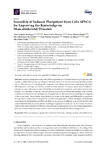Mostrar o rexistro simple do ítem
Versatility of induced Pluripotent Stem Cells (iPSCs) for improving the knowledge on musculoskeletal diseases
| dc.contributor.author | Sanjurjo-Rodríguez, Clara | |
| dc.contributor.author | Castro Viñuelas, Rocío | |
| dc.contributor.author | Piñeiro-Ramil, María | |
| dc.contributor.author | Rodríguez-Fernández, Silvia | |
| dc.contributor.author | Fuentes Boquete, Isaac Manuel | |
| dc.contributor.author | Blanco García, Francisco J | |
| dc.contributor.author | Díaz-Prado, Silvia | |
| dc.date.accessioned | 2020-09-30T10:20:08Z | |
| dc.date.available | 2020-09-30T10:20:08Z | |
| dc.date.issued | 2020-08-25 | |
| dc.identifier.citation | Sanjurjo-Rodríguez C, Castro-Viñuelas R, Piñeiro-Ramil M, et al. Versatility of induced Pluripotent Stem Cells (iPSCs) for improving the knowledge on musculoskeletal diseases. Int J Mol Sci. 2020; 21(17):6124 | es_ES |
| dc.identifier.issn | 1422-0067 | |
| dc.identifier.uri | http://hdl.handle.net/2183/26267 | |
| dc.description.abstract | [Abstract] Induced pluripotent stem cells (iPSCs) represent an unlimited source of pluripotent cells capable of di erentiating into any cell type of the body. Several studies have demonstrated the valuable use of iPSCs as a tool for studying the molecular and cellular mechanisms underlying disorders a ecting bone, cartilage and muscle, as well as their potential for tissue repair. Musculoskeletal diseases are one of the major causes of disability worldwide and impose an important socio-economic burden. To date there is neither cure nor proven approach for e ectively treating most of these conditions and therefore new strategies involving the use of cells have been increasingly investigated in the recent years. Nevertheless, some limitations related to the safety and di erentiation protocols among others remain, which humpers the translational application of these strategies. Nonetheless, the potential is indisputable and iPSCs are likely to be a source of di erent types of cells useful in the musculoskeletal field, for either disease modeling or regenerative medicine. In this review, we aim to illustrate the great potential of iPSCs by summarizing and discussing the in vitro tissue regeneration preclinical studies that have been carried out in the musculoskeletal field by using iPSCs. | es_ES |
| dc.description.sponsorship | (PI17/02197) from Instituto de Salud Carlos III-General Subdirection of Assessment and Promotion of the Research—European Regional Development Fund (FEDER) “A way of making Europe”; Rede Galega de Terapia Celular and Grupos con Potencial de Crecemento, Xunta de Galicia (R2016/036, R2014/050, CN2012/142 and GPC2014/048); University of A Coruña; María Piñeiro-Ramil and Silvia Rodríguez-Fernández are granted by a predoctoral fellowship from Xunta de Galicia and European Union (European Social Fund) and Clara Sanjurjo-Rodríguez is beneficiary of a postdoctoral fellowship from Xunta de Galicia. | es_ES |
| dc.description.sponsorship | info:eu-repo/grantAgreement/ISCIII/Programa Estatal de Fomento de la Investigación Científica y Técnica de Excelencia/PI17%2F02197/ES/CELULAS MADRE PLURIPOTENTES INDUCIDAS (IPS) COMO MODELO DE ARTROSIS DE MANOS | es_ES |
| dc.description.sponsorship | Xunta de Galicia; R2016/036 | es_ES |
| dc.description.sponsorship | Xunta de Galicia; R2014/050 | es_ES |
| dc.description.sponsorship | Xunta de Galicia; CN2012/142 | es_ES |
| dc.description.sponsorship | Xunta de Galicia; GPC2014/048 | |
| dc.language.iso | eng | es_ES |
| dc.publisher | MDPI | es_ES |
| dc.relation.uri | https://doi.org/10.3390/ijms21176124 | es_ES |
| dc.rights | Creative Commons Attribution 4.0 International Licence (CC-BY 4.0) | es_ES |
| dc.rights.uri | http://creativecommons.org/licenses/by/4.0/ | * |
| dc.subject | iPSCs | es_ES |
| dc.subject | Pluripotency | es_ES |
| dc.subject | Regenerative medicine | es_ES |
| dc.subject | EVs | es_ES |
| dc.subject | Bone | es_ES |
| dc.subject | Cartilage | es_ES |
| dc.subject | Muscle | es_ES |
| dc.subject | Intervertebral disc | es_ES |
| dc.title | Versatility of induced Pluripotent Stem Cells (iPSCs) for improving the knowledge on musculoskeletal diseases | es_ES |
| dc.type | info:eu-repo/semantics/article | es_ES |
| dc.rights.access | info:eu-repo/semantics/openAccess | es_ES |
| UDC.journalTitle | International Journal of Molecular Sciences | es_ES |
| UDC.volume | 21 | es_ES |
| UDC.issue | 17 | es_ES |
| UDC.startPage | 6124 | es_ES |
Ficheiros no ítem
Este ítem aparece na(s) seguinte(s) colección(s)
-
GI-TCMR - Artigos [129]
-
INIBIC-TCMR - Artigos [102]
-
GI-GIRS - Artigos [94]
-
INIBIC- REUMA - Artigos [184]







